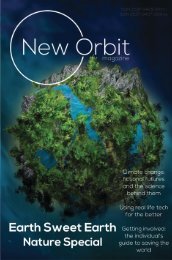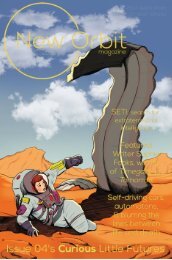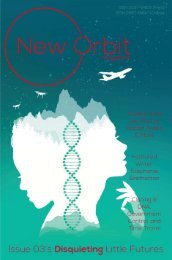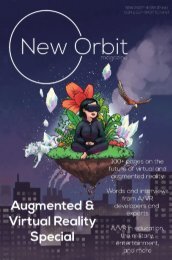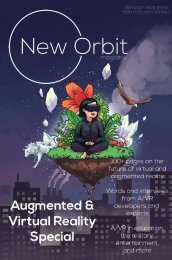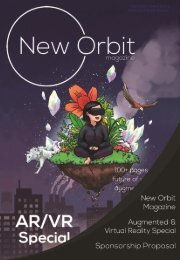New Orbit Magazine Issue 08; Feb 2020, The Future of Animals
- No tags were found...
You also want an ePaper? Increase the reach of your titles
YUMPU automatically turns print PDFs into web optimized ePapers that Google loves.
understand intelligence or sentience
equipped to tackle otherworldly species – or
even familiar species, outside of our own? If
a man killing a watery, inhuman creature on
its homeworld is acceptable, what arguments
do we have against the bigger fish killing us?
One of the smaller questions that Cyclic
Hunting could raise is one that is often
brushed aside in science fiction and
worldbuilding; if we were to come across an
alien world, just the right temperature and
with an atmosphere we could breathe, filled
with docile creatures what we could easily
hunt down, would we even be able to eat
them?
This question is somewhat more complex
than it may at first seem. The eating is less of
a problem, per se – you could chop one up
and consume the pieces, certainly – but if
that “food” was incompatible with our
metabolic and digestive systems, you could
eat all the extraterrestrial steak you wanted
and still starve.
So, would we be able to digest them?
Elaine Vilar Madruga’s Cyclic Hunting raises
a number of big, philosophical questions
about the relationships that exist across
species; would our interactions with alien
animals be the same as those we have with the
animals here on Earth? Is the way we
The answer is that, depending on the kinds
of life we stumble across in our explorations
of the universe, it is possible we’d be able to
eat and exchange nutrients with alien life, but
exceedingly unlikely. Dr Gareth Corbett,
gastroenterologist at Addenbrooke’s
Hospital in Cambridge, spoke to Naked
Scientists on just this subject in 2018:




